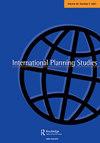手工业和带状发展:斯里兰卡科伦坡-康提路沿线的地点变化
IF 1.5
Q4 REGIONAL & URBAN PLANNING
引用次数: 1
摘要
摘要在许多亚洲国家,工艺工业在经济和社会生活中越来越重要。然而,它们的独特形式并没有得到很好的记录。从西方创意产业引进概念可能会损害未来的发展,因为西方创意产业呈现出不同的历史和空间动态。与西方城市工艺工业不同,南亚和东亚工艺工业在城市周边地区呈现出独特的“工艺带发展”形态。本文考察了斯里兰卡三个工艺行业——皮利马塔拉瓦黄铜、莫拉戈达陶器和韦瓦尔德尼亚甘蔗工业——工艺带发展的空间属性。我们将工艺丝带的发展分为三个历史阶段,这三个阶段与该国独特的社会经济变化有关。进行了调查和半结构化访谈,以追踪土地使用和建筑类型的变化。每一个案例都显示出与周边地区的视觉形态发生了重大变化,而且在市场化改革政策出台后,土地使用的变化加快了。本文章由计算机程序翻译,如有差异,请以英文原文为准。
Craft industries and ribbon development: place change along the Colombo-Kandy Road, Sri Lanka
ABSTRACT Craft industries are an increasingly significant component of economic and social life in many Asian countries. However, their unique forms are not well documented. Future development may be harmed by importing concepts from western creative industries, which exhibit different histories and spatial dynamics. Unlike western urban craft industries, South and East Asian craft industries assume a distinct morphological pattern of ‘craft ribbon development’ in peri-urban areas. This article examines the spatial attributes of craft ribbon development in three craft industries in Sri Lanka- Pilimathalawa Brass, Molagoda Pottery, and Wewaldeniya Cane industry. We frame craft ribbon development in three historical phases associated with the country's distinct socio-economic changes. Surveys and semi-structured interviews were carried out to trace the changes in land uses and building typologies. Each case shows significant visual morphological transformation with the surrounding area, and that land-use change was accelerated subsequent to the introduction of market-oriented reform policies.
求助全文
通过发布文献求助,成功后即可免费获取论文全文。
去求助
来源期刊

International Planning Studies
REGIONAL & URBAN PLANNING-
CiteScore
4.60
自引率
4.80%
发文量
20
期刊介绍:
Planning, at urban, regional, national and international levels, faces new challenges, notably those related to the growth of globalisation as both an objective socio-economic process and a shift in policy-maker perceptions and modes of analysis. International Planning Studies (IPS) addresses these issues by publishing quality research in a variety of specific fields and from a range of theoretical and normative perspectives, which helps improve understanding of the actual and potential role of planning and planners in this context.
 求助内容:
求助内容: 应助结果提醒方式:
应助结果提醒方式:


